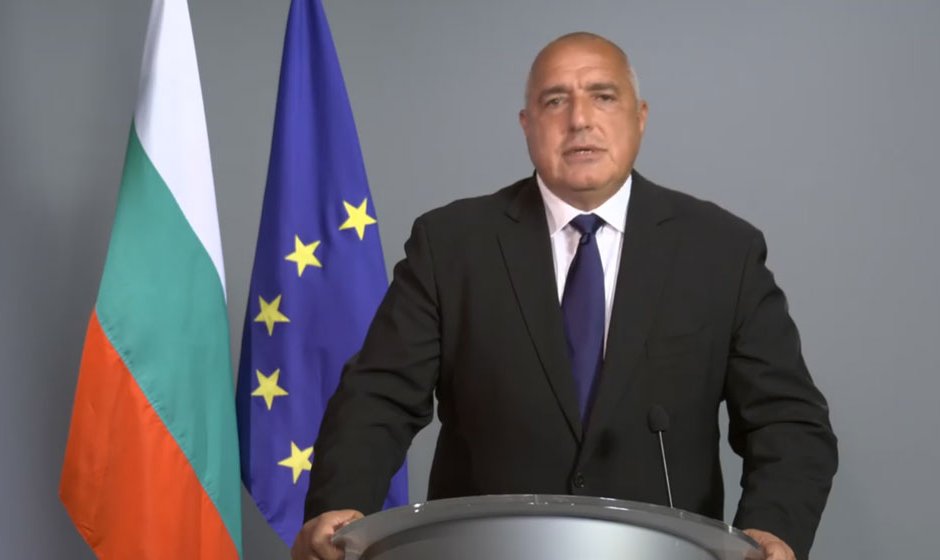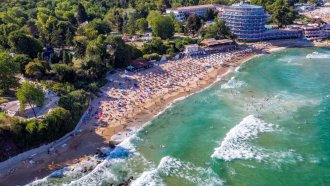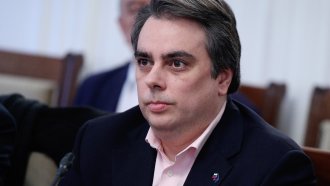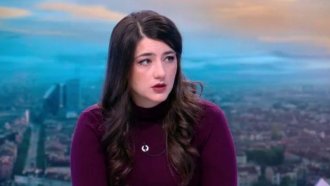As promised earlier this week, PM Boyko Borissov announced today the "major changes", which would "calm the people". When Borissov first said something significant is in the works, many were expecting he would be resigning instead. The cryptic clue at least communicated as much: Borissov will not be resigning soon. It spoke to his growing unwillingness to let go of power – an unwillingness, which over the past month has reached pathological proportions – a factor, which itself only fuels protesters’ demands for Borissov and his government to step down. If today’s 13-minute speech could be summarized in a single message, it is this: Not only will I not resign, I will do what I can to keep in power as long as possible – hopefully longer than the current mandate provides.
Antigovernment protests are happening across the country (and beyond – Bulgarians living abroad have organized demonstrations supporting the protests in many cities across Europe and North America) and nearing their 40-th day. The protesters are sticking to two main demands: resignation of the entire government and Prosecutor General Ivan Geshev. Throughout the period, Borissov has made several attempts to calm protesters with less, apparently hoping they would meet him half way. He removed ministers, spent incredible amounts of public money for giveaways to targeted groups to secure support, and bombarded the public space with an all-in array of PR to convince his government should carry out its full term, because otherwise the country would "collapse". But the protests have not budged an inch from their original demands: anything other than the two resignations has till now not moved protesters at all. If anything, it motivated them further.
There are a few important aspects of the speech, aside from what Borissov actually proposes in it. The first two-thirds of it were purely political, and as such revealed some key points regarding his stance on the political crisis. First, he painted "the young" as a group, which has good intentions but was apparently tricked by "the oligarchy", who in turn had "hijacked" their protest. It is unclear who Borissov views as the "oligarchy" but his personal and professional ties to it is what protesters define as the main reason for the seed rooted corruption in the country and the crucial element of the captured state. Second, Borissov spoke furiously and with unhindered anger. He banged his fist on the lectern, raised his voice and all but hissed at the camera. And all throughout – third – explained he would gladly give way to others but the protesters have failed to make their demands clear (except for resignation), have not presented a plan for what they want to achieve, how and with whom.
This is especially telling for how Borissov sees power. Which – granted – is understandable: between having been Bulgaria’s communist dictator Todor Zhivkov’s bodyguard (who was head of state for most of Bulgaria’s communist rule, until its collapse in 1989), spending the 90’s allegedly working for SIK – thought to be one of the foremost fronts of criminal organizations during the early transition years, and ending up having been PM of Bulgaria for more than a decade to date, his understanding of power is deeply rooted in the forceful acquisition of it. Yes - he said angrily – he and his party would gladly give the power to the protesters. But they, he explained in many words, have not proven to him they are deserving of it. In other words, the power – and mandate - of government is his by default, not the people’s. The decision to give it to the next contender is his to make.
The last third of the speech revealed the actual "decisions" he had taken. His party will prepare a draft of a new constitution. They will propose to Parliament to hold elections for a Grand Assembly. He listed a number of changes his party will propose as constitutional amendments. The tricky part of Borissov’s plan, however, is that almost all of these amendments do not require a Grand Assembly to be convened at all. So why is Borissov aiming at one?
The last Grand Assembly in Bulgaria was convened in 1991. It adopted the new constitution – to replace the supreme law governing the totalitarian communist state before its collapse. The Grand Assembly has almost twice as many MPs as a normal assembly – 400 instead of 240 – and – crucially – has no predefined term. The Grand Assembly receives a mandate to carry out the duties it was convened for, but the Constitution does not provide a timeframe for this. Theoretically, a Grand Assembly may take forever before it declares its work finished.
This is not the reason the concept of a Grand Assembly in Bulgaria has been harshly criticized from numerous experts over the years: rather the fact that it is an unnecessary and enormous bureaucratic obstacle to making certain changes to the Constitution. But abolishing the institution of the Grand Assembly could only be done by a Grand Assembly: which is why many experts have called at times for a Grand Assembly to be convened with the sole task to eliminate itself. This realistically would take a finite and easily observable amount of time. But adopting a new constitution without clearly defining its ‘new’-ness - might not be as easy to predict timewise. Especially due to the fact that what Borissov announced as concrete constitutional amendments could easily be done without a Grand Assembly (only some parts – the most basic - of the Constitution need a Grand Assembly to make changes).
Borissov calling for a National Assembly and a new Constitution is clearly a loud double down to not resigning. He and his team are incapable to offer anything that could make the protests go away or at least – divide them into more and less radical groups, thus weakening them. The protesters are not accepting anything less and do not want anything more than what they repeatedly demand every day: resignation of the government and Prosecutor General Ivan Geshev. As Borissov has seemingly taken a firm position he would do virtually anything but resign his government (as has Ivan Geshev), declaring a new supreme law in the works and a Grand Assembly seems the larger-than-life thing they could do without letting go of power.
But, not only the same problems persist – from the protesters’ standpoint – their demands have still not been met – Borissov actually is making a crude attempt not only to hold on to power – but to expand it.
First, a government and a head of state whose main and seemingly only priority is not letting go of power, on principle should not be given an opportunity to head a government within a Parliament with no predefined mandate. But even if this seems a little paranoid, the rest is here-and-now:
First and foremost, of course it seems unequivocally obnoxious for a government, barely surviving under the immense, ongoing and growing pressure from nation-wide protests and plummeting approval to have the audacity to engage the country in its attempt to author a new supreme law. But from a rather logistical point of view, convening a Grand Assembly takes time. If given the chance (Parliament must approve opening a procedure for Grand Assembly), Borissov will not only finish his term but then some, on a technicality.
If we look at his concrete proposals, edit out the ones he does not need a Grand Assembly for, we are left with a very straight forward picture:
Buy crucial time and prevent a provisional government. Convene a Grand Assembly reduce number of MPs by almost a half thus ensuring any smaller parties have no chance of ever passing the threshold to enter Parliament. As a bonus – new Constitution, keep Grand Assembly from finishing for as long (or short) as needed, spend the abundance of time and resource to ensure full majority in the next Parliament.
If this was not the plan, at least those are some major risks. But the reactions after Borissov’s speech don’t show any signs of support. President Roumen Radev spoke several hours later declaring he would block attempts for Grand Assembly and a new Constitution by this majority (the president must sign off on the procedure after Parliament passes it). Meanwhile, protesters across the country tonight blocked a number of intersections - apart from those blocked 24/7. Protesters seem not only cold by Borissov’s "decisions" but even angered he "dared lay a finger on the most sacred law of this land – our Constitution" – in one protester’s words. To this moment (9:00PM) are continuing to gather nationwide, demanding – again – resignation of the government and Prosecutor General Ivan Geshev.
Ключови думи
За честна и независима журналистика
Ще се радваме, ако ни подкрепите, за да може и занапред да разчитате на независима, професионална и честна информационно - аналитична медия.
 0 коментара
0 коментара
Екипът на Mediapool Ви уведомява, че администраторите на форума ще премахват всички мнения, съдържащи нецензурни квалификации, обиди на расова, етническа или верска основа.
Редакцията не носи отговорност за мненията, качени в Mediapool.bg от потребителите.
Коментирането под статии изисква потребителят да спазва правилата за участие във форумите на Mediapool.bg
Прочетете нашите правила за участие във форумите.
За да коментирате, трябва да влезете в профила си. Ако нямате профил, можете да се регистрирате.




